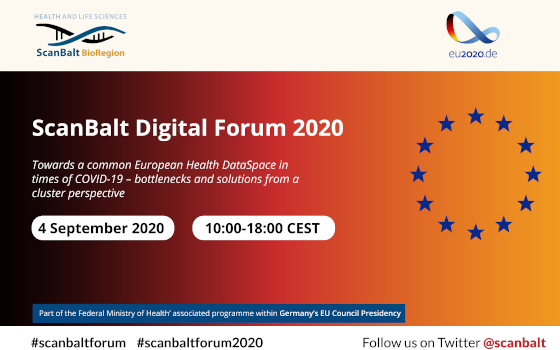ScanBalt invites European cluster organisations to join the formulation of a joint declaration on the necessary next steps to create the Common European Health Data Space. Clusters are invited to draw on the experience of their cluster members such as universities, hospitals, research institutions, pharmaceutical and med-tech companies and start-ups. The Joint Declaration will be presented to the German Council Presidency for its Council conclusions and further recommendations.
The current COVID 19 crises raises awareness of the need of data and best practise exchange and underlines the need for action. To learn and be better prepared for the future, it is important to gather the innovative digital solutions from the different areas of care, for example:
- Research (exchange of patient-related data in cross-border research projects, for example in infectiology or pharmacology)
- Patient care and nursing (cross-border coordination of capacities)
- Use of innovative digital apps (e.g. early warning system for new waves of infection or for monitoring social distancing measures)
- Suggestions for a fast track approval of digital solutions
Our aim is to collect and analyse the input on the above-mentioned topics and to formulate the joint declaration to be discussed at the ScanBalt Forum on the 4th of September 2020.
Due to potential travel restrictions, the ScanBalt Forum 2020 will be held for the first time as a purely digital conference. The Forum will focus on the examples that are provided by European cluster organizations and will bound these examples together with the help of panel discussions to a Joint Declaration. The Forum, as the Joint Declaration, has four Tracks:
- The cross-country collaboration on healthcare between European member states. The COVID-19 crisis has shown that we urgently need new possibilities for health data exchange across borders.
- Digital solution for the next generation of health research. University hospitals, research institutions, pharmaceutical /medtech companies and public health authorities rely on the possibility to exchange data for improving their business and the treatment of the European public.
- Digital solutions for a resilient population protection. COVID-19 has underlined the need for a consolidated and harmonized European digital infrastructure (tracing/early pandemic warning systems etc.). The future of the European idea of open borders and freedom of movement relies also on those technical solutions.
- Digital solutions for a protective elderly care and health care systems. In this chapter we will examine how digital solution could improve healthcare and elderly care systems regarding COVID-19 treatment and beyond.
For further information and to register, please visit:
https://scanbalt.org/scanbaltforum2020/
